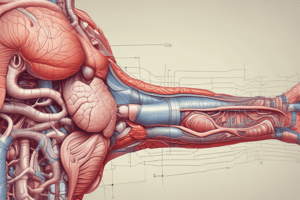Podcast
Questions and Answers
Which of the following accurately describes the role of villi in the small intestine?
Which of the following accurately describes the role of villi in the small intestine?
- Secreting digestive enzymes to break down the chyme.
- Producing bile to aid in the digestion of fats.
- Filtering out toxins and waste products from the bloodstream.
- Increasing the surface area for efficient nutrient absorption. (correct)
What is the primary function of the anal sphincter?
What is the primary function of the anal sphincter?
- To absorb any remaining water from the waste before excretion.
- To secrete enzymes that further break down waste material.
- To initiate peristaltic movements in the rectum.
- To prevent accidental bowel movements by controlling the release of waste. (correct)
Which of the following lists only accessory organs that contribute to the digestion process?
Which of the following lists only accessory organs that contribute to the digestion process?
- Esophagus, stomach, and small intestine.
- Salivary glands, stomach and colon.
- Liver, pancreas, and gall bladder. (correct)
- Large intestine, rectum, and anus.
What is the name of the solution of partially digested food, enzymes, and acids in the stomach called?
What is the name of the solution of partially digested food, enzymes, and acids in the stomach called?
Which process moves food down the esophogus to the stomach?
Which process moves food down the esophogus to the stomach?
Flashcards
Peristalsis
Peristalsis
The process where muscles in the esophagus contract and relax to move food from the mouth to the stomach.
Chyme
Chyme
A semi-liquid mixture of partially digested food, enzymes, and acids that moves from the stomach to the small intestine.
Villi
Villi
Finger-like projections in the lining of the small intestine that increase its surface area for improved nutrient absorption.
Anal Sphincter
Anal Sphincter
Signup and view all the flashcards
Liver
Liver
Signup and view all the flashcards
Study Notes
Digestive System Overview
- Esophagus: Peristalsis (muscle contractions) moves bolus (food) to stomach.
- Stomach: Produces HCl, enzymes, and muscle contractions to break down bolus into chyme. Stomach lining protected by mucus layer (pH 1–2).
- Small Intestine: Absorbs nutrients through villi (finger-like projections). Contains three parts: duodenum, jejunum, and ileum.
- Large Intestine (Colon): Reabsorbs water; leftover material becomes feces.
- Rectum and Anus: Stores feces until excretion; a muscular ring (anal sphincter) controls release.
- Accessory Organs:
- Salivary Glands: Produce enzymes for digestion.
- Liver: Produces bile, which helps in fat digestion.
- Gall Bladder: Stores bile.
- Pancreas: Produces enzymes for digestion.
Studying That Suits You
Use AI to generate personalized quizzes and flashcards to suit your learning preferences.




